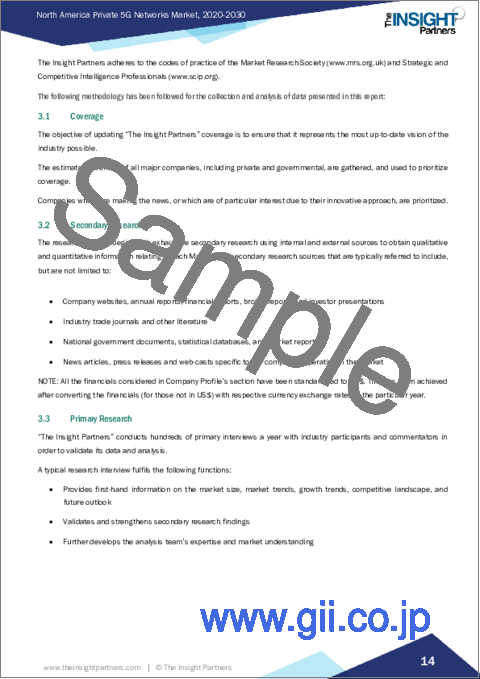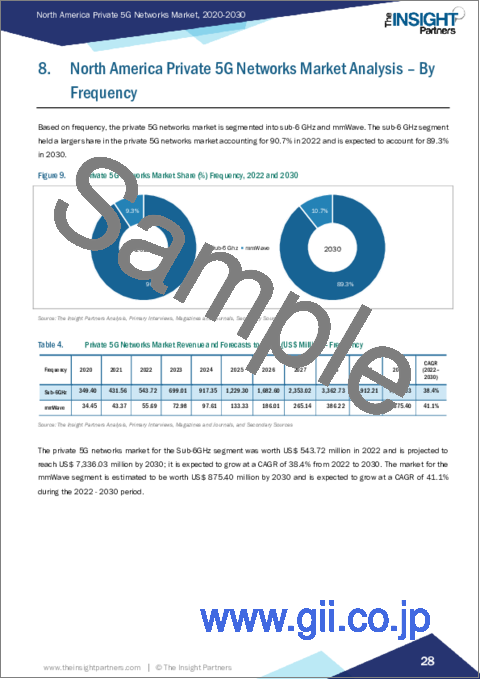|
|
市場調査レポート
商品コード
1533131
北米のプライベート5Gネットワーク:2030年市場予測- 地域別分析- コンポーネント別、周波数別、エンドユーザー別North America Private 5G Networks Market Forecast to 2030 - Regional Analysis - by Component, Frequency, and End User |
||||||
|
|||||||
| 北米のプライベート5Gネットワーク:2030年市場予測- 地域別分析- コンポーネント別、周波数別、エンドユーザー別 |
|
出版日: 2024年06月04日
発行: The Insight Partners
ページ情報: 英文 98 Pages
納期: 即納可能
|
全表示
- 概要
- 図表
- 目次
北米のプライベート5Gネットワーク市場は、2022年に5億9,941万米ドルと評価され、2030年には82億1,143万米ドルに達すると予測され、2022年から2030年までのCAGRは38.7%と推定されます。
IoT需要の増加が北米のプライベート5Gネットワーク市場を後押し
IoTデバイスは膨大な量のデータを生成するため、有用性を高めるには迅速かつ安定的に伝送する必要があります。プライベート5Gネットワークは、単一の組織や業界に特化しているため、IoTデバイス向けに広帯域、低遅延、より信頼性の高い接続性を提供できます。多くのIoTアプリケーションはリアルタイムのデータ処理を必要とします。例えば、自動運転車は、安全な運転判断を下すために、センサーデータをリアルタイムで受信し、処理する必要があります。プライベート5Gネットワークは、超低遅延と高信頼性を提供することで、これらのアプリケーションをサポートすることができます。NB-IoTやCat-Mなどの大規模IoT技術の採用は大幅に増加しています。例えば、2022年には、~125のサービスプロバイダーがNB-IoTネットワークを展開または商業的に立ち上げており、56近くがCat-Mを立ち上げています。2022年末までに、これらの技術によって接続されるデバイスの数は、ネットワークに追加された機能によって強化され、周波数分割複信(FDD)帯域において、周波数共有によって大規模なIoTが4Gや5Gと共存できるようになった。さらに、2022年にはブロードバンドIoT(4G/5G)接続が13億に達し、全セルラーIoTデバイスの最大シェアを接続しました。このセグメントには主に、マッシブIoTデバイスでサポートできるよりも高いスループット、低遅延、大容量のデータを必要とする広域ユースケースが含まれます。プライベート5Gネットワークは、IoTアプリケーションが必要とする帯域幅、遅延、信頼性、セキュリティを提供できます。そのため、IoTに対する要求の高まりは、プライベート5Gネットワークに対する強い需要を生み出しています。世界中の産業界は、業務を完全にデジタル化するためにインダストリー4.0を採用しようとしています。プライベート5G接続は、このプロセスにおいて重要な役割を果たしています。多くのソリューション・プロバイダーが、世界中の産業部門を支援するプライベート5Gソリューションの商用化を開始しています。
北米のプライベート5Gネットワーク市場概要
米国、カナダ、メキシコは北米の主要国です。北米は現在、プライベート5Gネットワークの最大市場の1つであるが、これは新技術をいち早く採用する企業や組織の多さ、イノベーションとデジタルトランスフォーメーションへの強い注力、5Gネットワークの展開に対する政府の支援、プライベート5Gネットワークプロバイダの整備されたエコシステムなど、多くの要因が存在するためです。さらに、米国はプライベートLTEおよび5Gワイヤレス・ネットワークの世界有数の市場であり、世界市場の31%を占めています。製造/工場、エネルギー/公共事業、運輸/物流、国防総省が、プライベート・ネットワークを利用する米国の主な業種です。
さらに、アメリカの電力会社は、サービスゾーン内の900 MHzと3.5 GHzのCBRS PAL(Priority Access License)周波数帯の確保に多大な投資を行っています。Ameren、Evergy、Hawaiian Electric、LCRA(Lower Colorado River Authority)、SCE(Southern California Edison)、SDG&E(San Diego Gas &Electric)、Southern Company、Xcel Energyは、グリッド近代化プログラムをサポートするために3GPPベースのプライベート・ワイヤレス・ネットワークを導入している会社のひとつです。北米のプライベート5Gネットワーク市場の主要プレーヤーには、AT&T、Verizon、T-Mobile US、Nokia、Ericsson、Cisco、Huawei、IBM、Dell Technologiesなどが含まれます。このように、北米のプライベート5Gネットワーク市場は、プライベート5Gネットワーク導入のメリットを認識する企業や組織が増えるにつれて、今後数年間で急成長を続けると予想されます。
北米のプライベート5Gネットワーク市場の収益と2030年までの予測(金額)
北米のプライベート5Gネットワーク市場セグメンテーション
北米のプライベート5Gネットワーク市場は、コンポーネント、周波数、エンドユーザー、国に基づいてセグメント化されます。コンポーネントに基づいて、北米のプライベート5Gネットワーク市場はハードウェア、ソフトウェア、サービスに分類されます。ハードウェアセグメントは2022年に最大の市場シェアを占めました。
周波数では、北米のプライベート5Gネットワーク市場はサブ6GHzとmmwaveに二分されます。サブ6GHzセグメントが2022年に大きな市場シェアを占めました。
エンドユーザー別では、北米のプライベート5Gネットワーク市場は、製造業、エネルギー・公共事業、自動車、軍事・防衛、政府・公共安全、その他に分類されます。2022年には製造業セグメントが最大の市場シェアを占めています。
国別では、北米のプライベート5Gネットワーク市場は米国、カナダ、メキシコに区分されます。2022年の北米のプライベート5Gネットワーク市場シェアは米国が独占しました。
Cisco Systems Inc、Huawei Technologies Co Ltd、Nokia Corp、Telefonaktiebolaget LM Ericsson、T-Systems International GmbH、Verizon Communications Inc、Vodafone Group Plc、AT&T、Qualcomm Inc、Amazon Web Services Incは、北米のプライベート5Gネットワーク市場で事業を展開する大手企業です。
目次
第1章 イントロダクション
第2章 エグゼクティブサマリー
- 主要洞察
- 市場の魅力
第3章 調査手法
- 調査範囲
- 2次調査
- 1次調査
第4章 北米のプライベート5Gネットワーク市場情勢
- エコシステム分析
- バリューチェーンのベンダー一覧
第5章 北米のプライベート5Gネットワーク市場:主要産業力学
- プライベート5Gネットワーク市場- 主要産業力学
- 市場促進要因
- IoT需要の増加
- 企業におけるデジタル化の進展
- 市場抑制要因
- 高い導入コストと保守コスト
- カバーエリアの狭さ
- 市場機会
- 自動車産業におけるタイムセンシティブネットワーキングの導入拡大
- 鉱業におけるプライベート5Gネットワークの採用拡大
- 今後の動向
- 5Gスモールセルの利用増加
- 促進要因と阻害要因の影響
第6章 プライベート5Gネットワーク市場:北米市場分析
- プライベート5Gネットワークの市場収益、2022年~2030年
- プライベート5Gネットワーク市場の予測と分析
第7章 北米のプライベート5Gネットワーク市場分析:コンポーネント別
- ハードウェア
- ソフトウェア
- サービス
第8章 北米のプライベート5Gネットワーク市場分析:周波数別
- サブ6GHz
- ミリ波
第9章 北米のプライベート5Gネットワーク市場分析:エンドユーザー別
- 製造業
- エネルギー・公益事業
- 自動車
- 軍事・防衛
- 政府・公共安全
- その他
第10章 北米のプライベート5Gネットワーク市場:国別分析
- 北米
- 米国
- カナダ
- メキシコ
第11章 競合情勢
- 主要企業によるヒートマップ分析
第12章 業界情勢
- 市場イニシアティブ
- 製品開発
第13章 企業プロファイル
- Cisco Systems Inc
- Huawei Technologies Co Ltd
- Nokia Corp
- Telefonaktiebolaget LM Ericsson
- T-Systems International GmbH.
- Verizon Communications Inc
- Vodafone Group Plc
- AT&T Inc
- Qualcomm Inc
- Amazon Web Services Inc
第14章 付録
List Of Tables
- Table 1. Private 5G Networks Market Segmentation
- Table 2. Private 5G Networks Market Revenue and Forecasts to 2030 (US$ Million)
- Table 3. Private 5G Networks Market Revenue and Forecasts to 2030 (US$ Million) - Component
- Table 4. Private 5G Networks Market Revenue and Forecasts to 2030 (US$ Million) - Frequency
- Table 5. Private 5G Networks Market Revenue and Forecasts to 2030 (US$ Million) - End User
- Table 6. North America Private 5G Networks Market Revenue and Forecasts to 2030 (US$ Mn) - By Country
- Table 7. US Private 5G Networks Market Revenue and Forecasts to 2030 (US$ Mn) - By Component
- Table 8. US Private 5G Networks Market Revenue and Forecasts to 2030 (US$ Mn) - By Frequency
- Table 9. US Private 5G Networks Market Revenue and Forecasts to 2030 (US$ Mn) - By End User
- Table 10. Canada Private 5G Networks Market Revenue and Forecasts to 2030 (US$ Mn) - By Component
- Table 11. Canada Private 5G Networks Market Revenue and Forecasts to 2030 (US$ Mn) - By Frequency
- Table 12. Canada Private 5G Networks Market Revenue and Forecasts to 2030 (US$ Mn) - By End User
- Table 13. Mexico Private 5G Networks Market Revenue and Forecasts to 2030 (US$ Mn) - By Component
- Table 14. Mexico Private 5G Networks Market Revenue and Forecasts to 2030 (US$ Mn) - By Frequency
- Table 15. Mexico Private 5G Networks Market Revenue and Forecasts to 2030 (US$ Mn) - By End User
- Table 16. Heat Map Analysis by Key Players
- Table 17. List of Abbreviation
List Of Figures
- Figure 1. Private 5G Networks Market Segmentation, By Country
- Figure 2. Ecosystem: Private 5G Networks Market
- Figure 3. Impact Analysis of Drivers and Restraints
- Figure 4. Private 5G Networks Market Revenue (US$ Million), 2022 - 2030
- Figure 5. Private 5G Networks Market Share (%) - Component, 2022 and 2030
- Figure 6. Hardware Market Revenue and Forecasts to 2030 (US$ Million)
- Figure 7. Software Market Revenue and Forecasts to 2030 (US$ Million)
- Figure 8. Services Market Revenue and Forecasts to 2030 (US$ Million)
- Figure 9. Private 5G Networks Market Share (%) Frequency, 2022 and 2030
- Figure 10. Sub-6 GHz Market Revenue and Forecasts to 2030 (US$ Million)
- Figure 11. mmWave Market Revenue and Forecasts to 2030 (US$ Million)
- Figure 12. Private 5G Networks Market Share (%) End User, 2022 and 2030
- Figure 13. Manufacturing Market Revenue and Forecasts to 2030 (US$ Million)
- Figure 14. Energy and Utilities Market Revenue and Forecasts to 2030 (US$ Million)
- Figure 15. Automotive Market Revenue and Forecasts to 2030 (US$ Million)
- Figure 16. Military and Defense Market Revenue and Forecasts to 2030 (US$ Million)
- Figure 17. Government and Public Safety Market Revenue and Forecasts to 2030 (US$ Million)
- Figure 18. Others Market Revenue and Forecasts to 2030 (US$ Million)
- Figure 19. North America Private 5G Networks Market Revenue, By Key Country, (2022) (US$ Million)
- Figure 20. Private 5G Networks Market Breakdown by Key Countries, 2022 and 2030 (%)
- Figure 21. US Private 5G Networks Market Revenue and Forecasts to 2030 (US$ Mn)
- Figure 22. Canada Private 5G Networks Market Revenue and Forecasts to 2030 (US$ Mn)
- Figure 23. Mexico Private 5G Networks Market Revenue and Forecasts to 2030 (US$ Mn)
The North America private 5G networks market was valued at US$ 599.41 million in 2022 and is expected to reach US$ 8,211.43 million by 2030; it is estimated to record a CAGR of 38.7% from 2022 to 2030.
Increasing Demand for IoT Fuels North America Private 5G Networks Market
IoT devices generate substantial amounts of data, which needs to be transmitted quickly and consistently to be useful. Private 5G networks are dedicated to a single organization or industry, which empowers them to offer higher bandwidth, lower latency, and more reliable connectivity for IoT devices. Many IoT applications require real-time data processing. For example, self-driving cars are required to receive and process sensor data in real-time to make safe driving decisions. Private 5G networks can support these applications by providing ultra-low latency and high reliability. The adoption of massive IoT technologies such as NB-IoT and Cat-M is increasing significantly. For instance, in 2022, ~125 service providers have deployed or commercially launched NB-IoT networks, and nearly 56 have launched Cat-M, while 40 have deployed both technologies globally. By the end of 2022, the number of devices connected by these technologies got enhanced by added capabilities in the networks, enabling massive IoT to co-exist with 4G and 5G in frequency division duplex (FDD) bands via spectrum sharing. Additionally, in 2022, broadband IoT (4G/5G) connections reached 1.3 billion and connected the largest share of all cellular IoT devices. This segment mainly includes wide-area use cases that require higher throughput, lower latency, and larger data volumes than can be supported by Massive IoT devices. Private 5G networks can offer the bandwidth, latency, reliability, and security that IoT applications require. Therefore, the increasing requirement for IoT is creating a strong demand for private 5G networks. Industries across the globe are on the verge of adopting Industry 4.0 in order to completely transform their operations digitally. Private 5G connectivity plays an important role in this process. Many solution providers have begun to commercialize their private 5G solutions for aiding the industrial sectors across the globe.
North America Private 5G Networks Market Overview
The US, Canada, and Mexico are major countries in North America. North America is currently one of the largest markets for private 5G networks due to the presence of a number of factors, including a large number of enterprises and organizations that are early adopters of new technologies, a strong focus on innovation and digital transformation, government support for the deployment of 5G networks, and well-developed ecosystem of private 5G network providers. Further, the US is one of the world's leading markets for private LTE and 5G wireless networks, accounting for 31% of the global market. Manufacturing/factories, energy/utilities, transportation/logistics, and the Department of Defense are the major verticals in the country that use private networks.
Moreover, American utility companies have made significant investments in securing the CBRS PAL (Priority Access License) spectrum at 900 MHz and 3.5 GHz inside their service zones. Ameren, Evergy, Hawaiian Electric, LCRA (Lower Colorado River Authority), SCE (Southern California Edison), SDG&E (San Diego Gas & Electric), Southern Company, and Xcel Energy are among the companies implementing 3GPP-based private wireless networks in support of grid modernization programs. Major players in the North America private 5G network market include AT&T, Verizon, T-Mobile US, Nokia, Ericsson, Cisco, Huawei, IBM, and Dell Technologies. Thus, the private 5G network market in North America is expected to continue to grow rapidly in the coming years as more and more enterprises and organizations recognize the benefits of deploying private 5G networks.
North America Private 5G Networks Market Revenue and Forecast to 2030 (US$ Million)
North America Private 5G Networks Market Segmentation
The North America private 5G networks market is segmented based on component, frequency, end user, and country. Based on component, the North America private 5G networks market is categorized into hardware, software, and services. The hardware segment held the largest market share in 2022.
In terms of frequency, the North America private 5G networks market is bifurcated into sub-6GHz and mmwave. The sub-6GHz segment held a larger market share in 2022.
By end user, the North America private 5G networks market is categorized into manufacturing, energy and utilities, automotive, military and defense, government and public safety, and others. The manufacturing segment held the largest market share in 2022.
Based on country, the North America private 5G networks market is segmented into the US, Canada, and Mexico. The US dominated the North America private 5G networks market share in 2022.
Cisco Systems Inc, Huawei Technologies Co Ltd, Nokia Corp, Telefonaktiebolaget LM Ericsson, T-Systems International GmbH, Verizon Communications Inc, Vodafone Group Plc, AT&T, Qualcomm Inc, and Amazon Web Services Inc are some of the leading companies operating in the North America private 5G networks market.
Table Of Contents
1. Introduction
- 1.1 The Insight Partners Research Report Guidance
- 1.2 Market Segmentation
2. Executive Summary
- 2.1 Key Insights
- 2.2 Market Attractiveness
3. Research Methodology
- 3.1 Coverage
- 3.2 Secondary Research
- 3.3 Primary Research
4. North America Private 5G Networks Market Landscape
- 4.1 Overview
- 4.2 Ecosystem Analysis
- 4.2.1 List of Vendors in Value Chain
5. North America Private 5G Networks Market - Key Industry Dynamics
- 5.1 Private 5G Networks Market - Key Industry Dynamics
- 5.2 Market Drivers
- 5.2.1 Increasing Demand for IoT
- 5.2.2 Rising Digitalization across Enterprises
- 5.3 Market Restraints
- 5.3.1 High Deployment and Maintenance Cost
- 5.3.2 Limited Coverage Area
- 5.4 Market Opportunities
- 5.4.1 Increasing Deployment of Time-Sensitive Networking in Automotive Industries
- 5.4.2 Growing adoption of Private 5G Networks in Mining Industry
- 5.5 Future Trends
- 5.5.1 Increasing use of 5G small cells
- 5.6 Impact of Drivers and Restraints:
6. Private 5G Networks Market - North America Market Analysis
- 6.1 Private 5G Networks Market Revenue (US$ Million), 2022 - 2030
- 6.2 Private 5G Networks Market Forecast and Analysis
7. North America Private 5G Networks Market Analysis - By Component
- 7.1 Hardware
- 7.1.1 Overview
- 7.1.2 Hardware Market, Revenue and Forecast to 2030 (US$ Million)
- 7.2 Software
- 7.2.1 Overview
- 7.2.2 Software Market, Revenue and Forecast to 2030 (US$ Million)
- 7.3 Services
- 7.3.1 Overview
- 7.3.2 Services Market, Revenue and Forecast to 2030 (US$ Million)
8. North America Private 5G Networks Market Analysis - By Frequency
- 8.1 Sub-6 GHz
- 8.1.1 Overview
- 8.1.2 Sub-6 GHz Market Revenue and Forecast to 2030 (US$ Million)
- 8.2 mmWave
- 8.2.1 Overview
- 8.2.2 mmWave Market Revenue and Forecast to 2030 (US$ Million)
9. North America Private 5G Networks Market Analysis - By End User
- 9.1 Manufacturing
- 9.1.1 Overview
- 9.1.2 Manufacturing Market Revenue and Forecast to 2030 (US$ Million)
- 9.2 Energy and Utilities
- 9.2.1 Overview
- 9.2.2 Energy and Utilities Market Revenue and Forecast to 2030 (US$ Million)
- 9.3 Automotive
- 9.3.1 Overview
- 9.3.2 Automotive Market Revenue and Forecast to 2030 (US$ Million)
- 9.4 Military and Defense
- 9.4.1 Overview
- 9.4.2 Military and Defense Market Revenue and Forecast to 2030 (US$ Million)
- 9.5 Government and Public Safety
- 9.5.1 Overview
- 9.5.2 Government and Public Safety Market Revenue and Forecast to 2030 (US$ Million)
- 9.6 Others
- 9.6.1 Overview
- 9.6.2 Others Market Revenue and Forecast to 2030 (US$ Million)
10. North America Private 5G Networks Market - Country Analysis
- 10.1 North America
- 10.1.1 North America Private 5G Networks Market Overview
- 10.1.2 North America Private 5G Networks Market Revenue and Forecasts and Analysis - By Country
- 10.1.2.1 North America Private 5G Networks Market Revenue and Forecasts and Analysis - By Country
- 10.1.2.2 US Private 5G Networks Market Revenue and Forecasts to 2030 (US$ Mn)
- 10.1.2.2.1 US Private 5G Networks Market Breakdown by Component
- 10.1.2.2.2 US Private 5G Networks Market Breakdown by Frequency
- 10.1.2.2.3 US Private 5G Networks Market Breakdown by End User
- 10.1.2.3 Canada Private 5G Networks Market Revenue and Forecasts to 2030 (US$ Mn)
- 10.1.2.3.1 Canada Private 5G Networks Market Breakdown by Component
- 10.1.2.3.2 Canada Private 5G Networks Market Breakdown by Frequency
- 10.1.2.3.3 Canada Private 5G Networks Market Breakdown by End User
- 10.1.2.4 Mexico Private 5G Networks Market Revenue and Forecasts to 2030 (US$ Mn)
- 10.1.2.4.1 Mexico Private 5G Networks Market Breakdown by Component
- 10.1.2.4.2 Mexico Private 5G Networks Market Breakdown by Frequency
- 10.1.2.4.3 Mexico Private 5G Networks Market Breakdown by End User
11. Competitive Landscape
- 11.1 Heat Map Analysis by Key Players
12. Industry Landscape
- 12.1 Overview
- 12.2 Market Initiative
- 12.3 Product Development
13. Company Profiles
- 13.1 Cisco Systems Inc
- 13.1.1 Key Facts
- 13.1.2 Business Description
- 13.1.3 Products and Services
- 13.1.4 Financial Overview
- 13.1.5 SWOT Analysis
- 13.1.6 Key Developments
- 13.2 Huawei Technologies Co Ltd
- 13.2.1 Key Facts
- 13.2.2 Business Description
- 13.2.3 Products and Services
- 13.2.4 Financial Overview
- 13.2.5 SWOT Analysis
- 13.2.6 Key Developments
- 13.3 Nokia Corp
- 13.3.1 Key Facts
- 13.3.2 Business Description
- 13.3.3 Products and Services
- 13.3.4 Financial Overview
- 13.3.5 SWOT Analysis
- 13.3.6 Key Developments
- 13.4 Telefonaktiebolaget LM Ericsson
- 13.4.1 Key Facts
- 13.4.2 Business Description
- 13.4.3 Products and Services
- 13.4.4 Financial Overview
- 13.4.5 SWOT Analysis
- 13.4.6 Key Developments
- 13.5 T-Systems International GmbH.
- 13.5.1 Key Facts
- 13.5.2 Business Description
- 13.5.3 Products and Services
- 13.5.4 Financial Overview
- 13.5.5 SWOT Analysis
- 13.5.6 Key Developments
- 13.6 Verizon Communications Inc
- 13.6.1 Key Facts
- 13.6.2 Business Description
- 13.6.3 Products and Services
- 13.6.4 Financial Overview
- 13.6.5 SWOT Analysis
- 13.6.6 Key Developments
- 13.7 Vodafone Group Plc
- 13.7.1 Key Facts
- 13.7.2 Business Description
- 13.7.3 Products and Services
- 13.7.4 Financial Overview
- 13.7.5 SWOT Analysis
- 13.7.6 Key Developments
- 13.8 AT&T Inc
- 13.8.1 Key Facts
- 13.8.2 Business Description
- 13.8.3 Products and Services
- 13.8.4 Financial Overview
- 13.8.5 SWOT Analysis
- 13.8.6 Key Developments
- 13.9 Qualcomm Inc
- 13.9.1 Key Facts
- 13.9.2 Business Description
- 13.9.3 Products and Services
- 13.9.4 Financial Overview
- 13.9.5 SWOT Analysis
- 13.9.6 Key Developments
- 13.10 Amazon Web Services Inc
- 13.10.1 Key Facts
- 13.10.2 Business Description
- 13.10.3 Products and Services
- 13.10.4 Financial Overview
- 13.10.5 SWOT Analysis
- 13.10.6 Key Developments
14. Appendix
- 14.1 About the Insight Partners
- 14.2 Word Index






